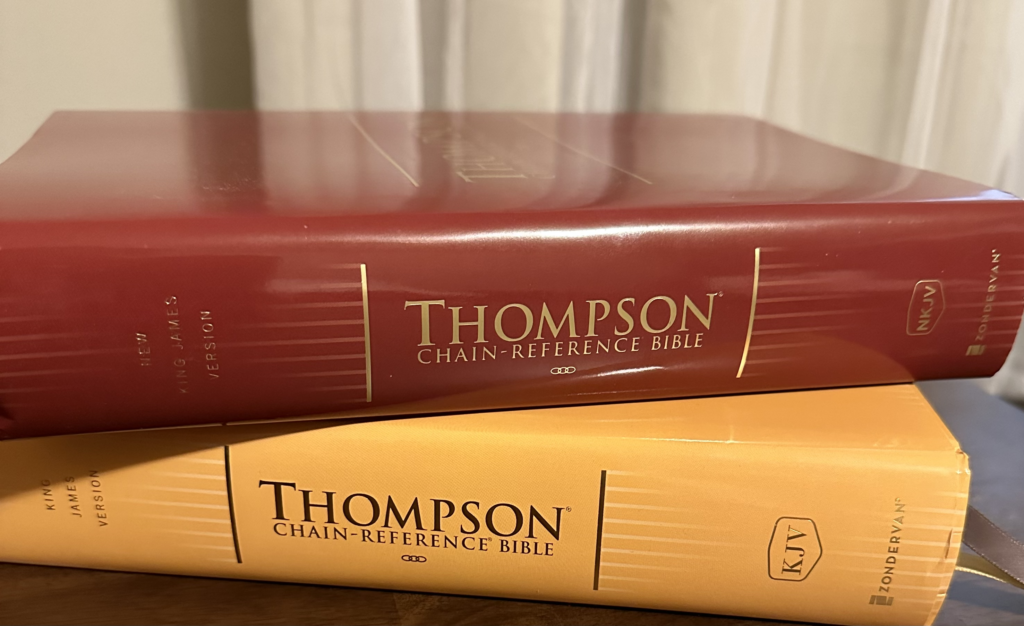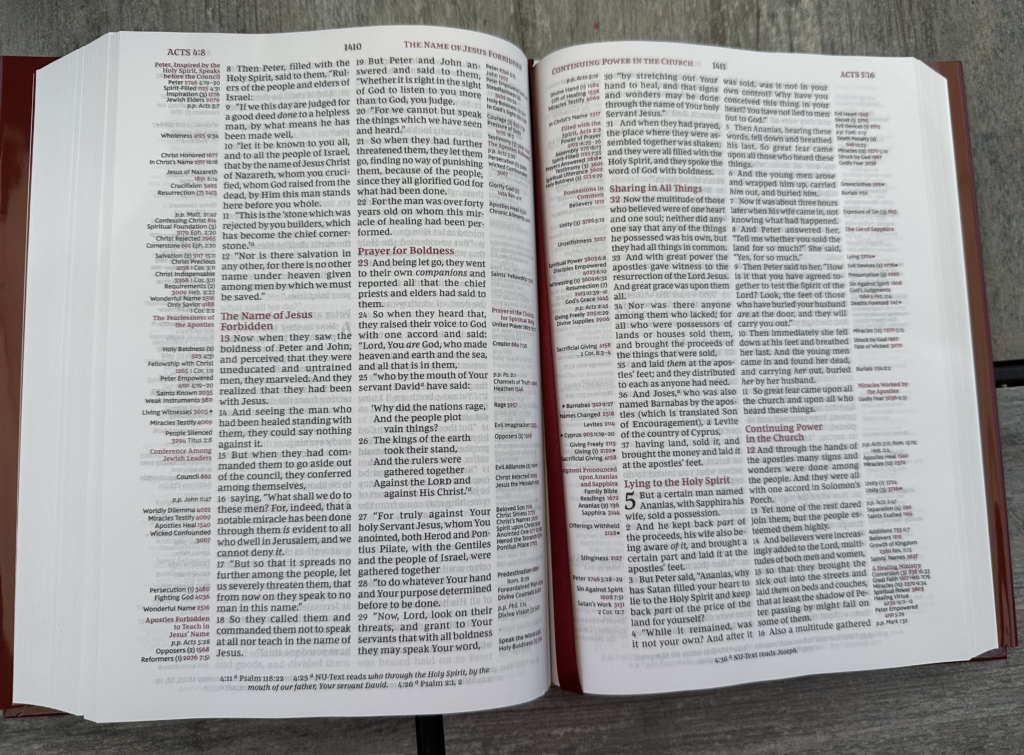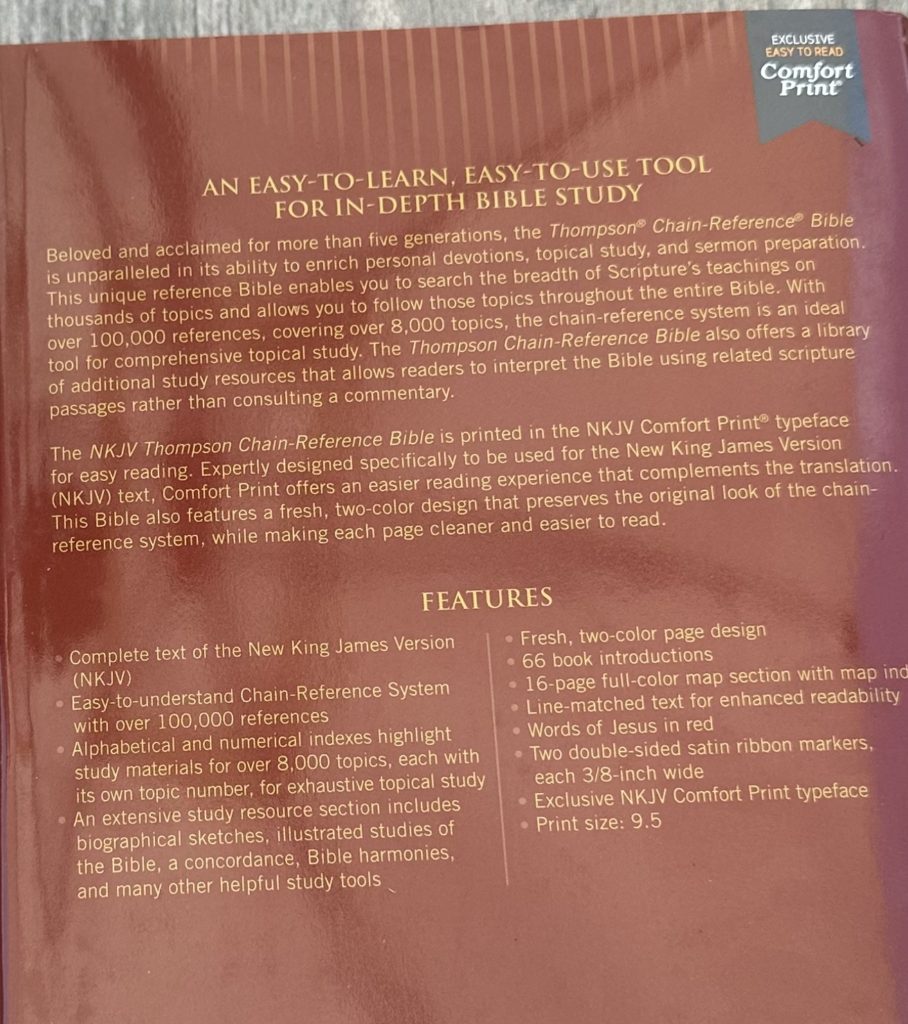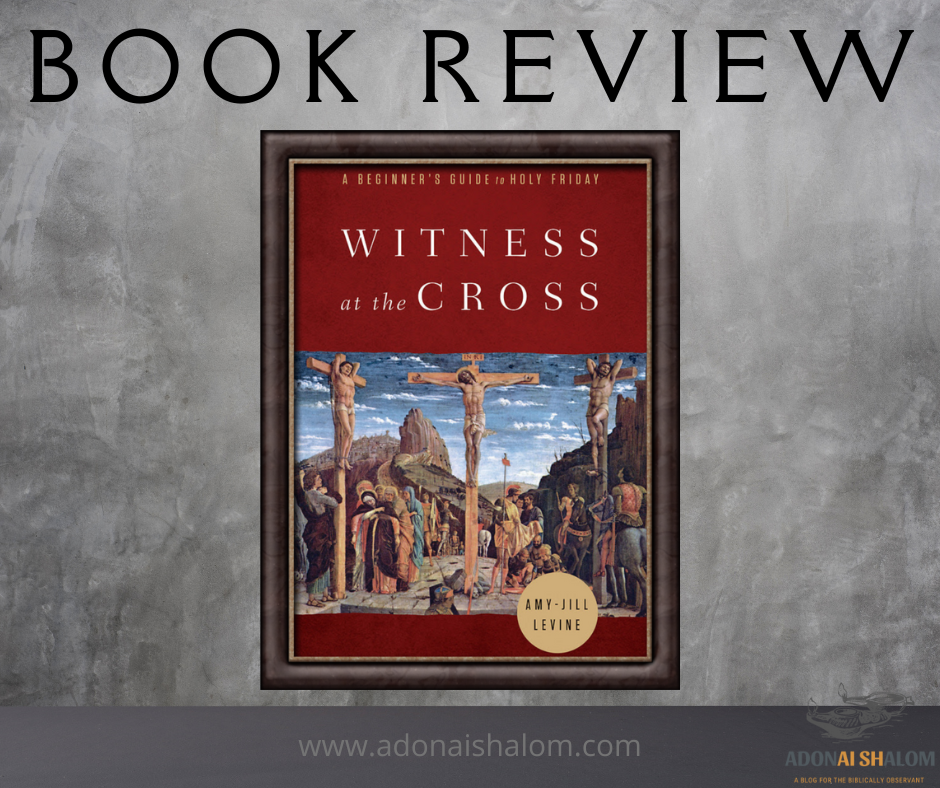Daniel 1: God our Governor (a verse-by-verse Bible study)
7 Adar I 5784 B”H
Background on the Book of Daniel
Daniel is a complex, but very fascinating book of the Bible.
Time periods covered by the book of Daniel
The book of Daniel covers the Babylonian captivity though the second coming of Christ our Messiah!
Languages used in the original text of of the book of Daniel
Daniel 1 and 8-12 were originally written in Hebrew while Daniel 2-7 were written in Aramaic (which was the language of the Chaldean Babylonians.) Daniel had become so fluent in the language of the Chaldean regime that he actually wrote chapters 2-7 in their (the Babylonians’) language.
There are also actually a few Persian words in the book of Daniel (Babylon was a “satrapy”, meaning a province of the Persian empire). Additionally, some Greek language musical instrument names (indicating the origin of the instruments) are found in Daniel 3, for example.
Who wrote the book of Daniel?
Daniel 7:15 tells us in the first person that Daniel is the author. He wrote in 3rd person (Daniel 1-7:14) until that point when he switched into his 1st person account.
“I, Daniel, was grieved in my spirit within my body, and the visions of my head troubled me." Daniel 7:15
Now for the skeptics out there who would like even further evidence that corroborates our claim of Daniel’s self-authorship, Jesus (Yeshua) Himself ascribes Daniel’s prophecies to – Daniel. (Matthew 24:15; Mark 13:14). If Jesus accepted Daniel as the author of Daniel . . . that should be good enough for us. Scripture and even extraBiblical historical chronicles provide overwhelming evidence that Daniel was a reliable historian as well as prophetic figure.
Who was Daniel prior to Daniel Chapter 1?
In Daniel chapter 1, which we will get to in a moment, the now-experienced servant of God, Daniel, is reflecting upon his experience in being taken captive and deported to Babylon from Judah. He describes himself as one among the youths who were taken in the first wave around 597BC. Some say the date would have to be a little later, such as 587BC. In any case, it is believed to be accurate to say that Nebuchadnezzar destroyed Jerusalem in 586BC.
But who was Daniel before he was taken captive?
We don’t know Daniel’s exact age when Nebuchadnezzar’s army came, but we can reasonably deduce a few of his attributes. It is likely that Daniel came from Israel’s upper class precisely because he was included in the first group of captives. Many kings in those days would conquer another king and capture the rest of their noble family and relatives. So Daniel would have had fairly prosperous and distinguished ruling class parents and he would have had opportunities available to him in Judah like attending the best schools or easily obtaining an influential job.
An analysis of the dates in the Biblical record shows that when Daniel was a child, the good, God-fearing young King Josiah would have been reigning. Daniel and his family would have been well-aware of King Josiah‘s positive reforms in restoring Solomon’s temple and the finding of the Book of the Law (2 Kings 22-23). King Josiah was the last good king who reigned in the Southern Kingdom (Judah) prior to the Babylonian takeover. During King Josiah’s reign, the people experienced revival and restoration.
After King Josiah died, Judah’s leadership returned to the idolatry and wickedness that had characterized the Southern Kingdom for so long. Like those of us who lament the ungodliness that permeates our nation today, Daniel would have observed the stark difference between living under godly leadership versus living under the corrupt and ungodly leadership of people like King Jehoiakim as he was growing up. God was preparing Daniel, ever since his youth, to be an influential leader and also important writer of the Biblical text.
World History at the time of Daniel
Jeremiah
Not everyone realizes that Daniel actually lived at the same time as Jeremiah and Ezekiel, so he was a contemporary of these prophets. During the reign of King Josiah (Daniel, remember, was a little boy then), Jeremiah was beginning his prophetic ministry.
Jeremiah ended up fleeing with a remnant to Egypt (he started in a northern town called Mizpah and ended up going through Gaza and then down into Egypt in a place known as Tahpanhes along the Nile River.) Jeremiah never gets a break from being the prophet of lamentation and he continues prophesying that Nebuchadnezzar would reach Egypt, as well, as part of God’s judgment (Jeremiah 43:8-13).
Daniel grew up with positive spiritual influences. Besides living under King Josiah’s godly leadership, Daniel would have grown up hearing Jeremiah’s prophecies. Daniel demonstrated exceptionally strong faith in the LORD and it is fair to attribute some of that to his godly upbringing. Never underestimate the value of training up your children in the way they should go:
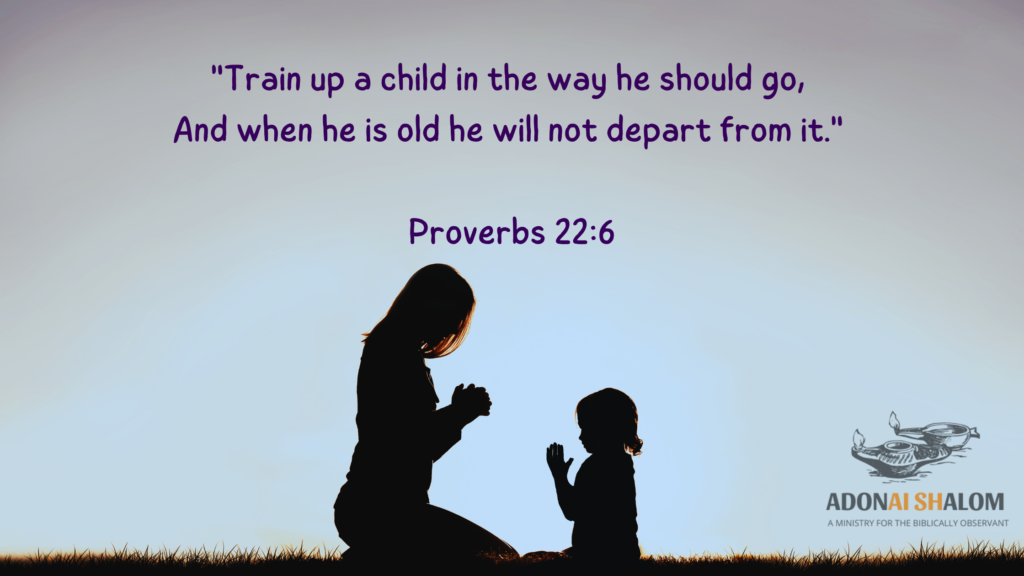
Ezekiel
Ezekiel was taken in the second wave to Babylon where he was enlisted as a slave and preached by the rivers of Babylon:
Now it came to pass in the thirtieth year, in the fourth month, on the fifth day of the month, as I was among the captives by the River Chebar, that the heavens were opened and I saw visions of God. On the fifth day of the month, which was in the fifth year of King Jehoiachin’s captivity, the word of the Lord came expressly to Ezekiel the priest, the son of Buzi, in the land of the Chaldeans by the River Chebar; and the hand of the Lord was upon him there." Ezekiel 1:3
Aesop & The Greek Civilization
While all of that was going on in the Middle East, the Greek civilization was also flourishing. In Greece, a slave was gaining popularity for his storytelling abilities.
Have you ever read Aesop’s fables? Aesop was born in 600BC so he would have likely been aware of Babylon’s conquests east of the Mediterranean. Aesop’s fables (like the Tortoise and the Hare or The City Mouse and The Country Mouse) were so clever that it is said that his master finally gave him his freedom.
If you know those stories, Aesop used animals to represent people. That would have been a very wise tactic in his day. Just as in Babylon, the Greek culture had a hierarchical society, so Aesop could make societal commentary without directly offending a noble and ending up in jail.
Within the next hundred years or so, democracy was established in Athens, Greece. Then the famous philosophers like Plato and Socrates lived, so there was a lot going on in that region.
Let’s get to the Biblical text now:
Daniel 1:1
"In the third year of the reign of Jehoiakim king of Judah, Nebuchadnezzar king of Babylon came to Jerusalem and besieged it." Daniel 1:1
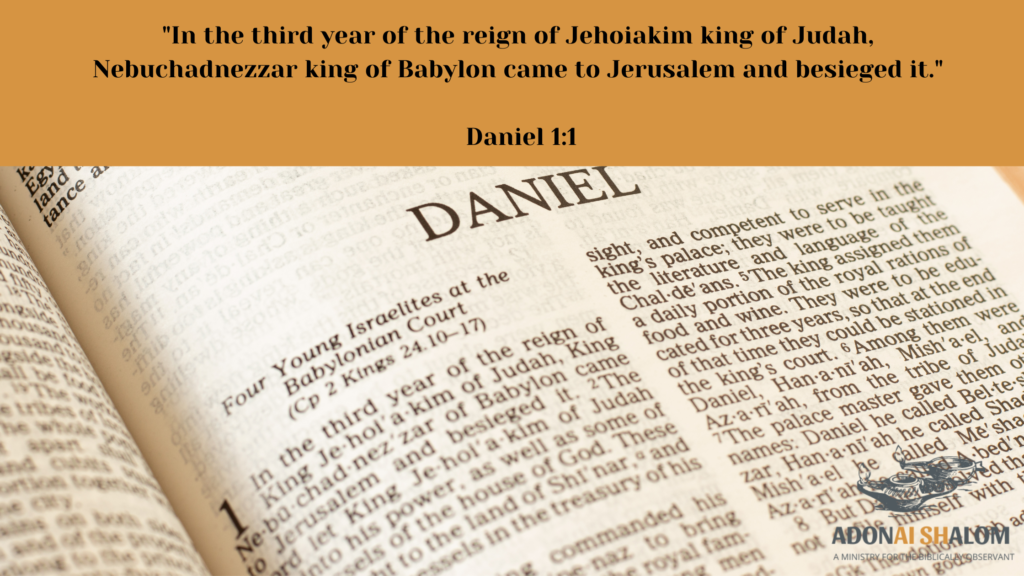
Daniel 1:1 records the existence of 2 different kings:
- Jehoiakim (king of Judah – remember, Judah was the Southern Kingdom after the North/South split over the disputes between Rehoboam and Jeroboam).
- King Nebuchadnezzar (king of Babylon). Nebuchadnezzar (II) was the son of Nabopolassar, the founder of the Neo-Babylonian/Chaldean empire. He was probably named after his grandfather, Nebuchadnezzar I. King Nebuchadnezzar reigned from 605-562 BC: 43 years – making him the longest reigning king of Babylon. He tackled a large number of construction projects, one of the more famous being the Hanging Gardens of Babylon which you may know were considered one of the Seven Wonders of the Ancient World.
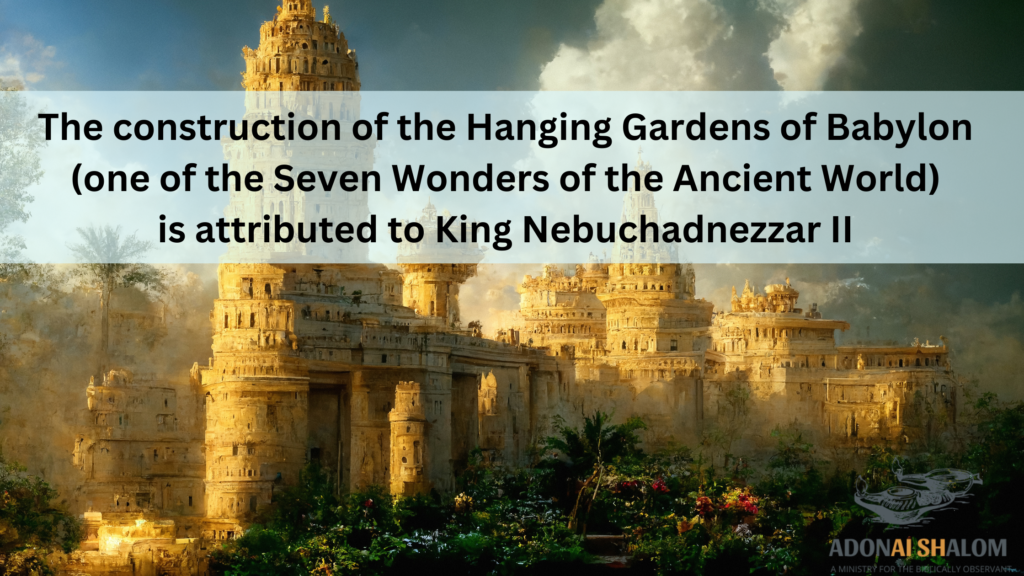
Jehoiakim
Jehoiakim was one of Josiah’s sons. He chose wickedness rather than following his father’s righteous example of leadership. We find information about him in the Biblical Chronicles:
Notice in 2 Chronicles 36:4, the Egyptian Pharaoh Necho (probably Necho II) changed Eliakim’s name to Jehoiakim.
Hebrew names had great significance and we will talk further about this when we get to the changed names of Daniel and his friends, but a way for another nation to exert dominance would include the changing of an individual’s name.
Interestingly enough, the name “Eliakim” meant, “God (or El/Elohim) will establish or raise up.” The name “Jehoiakim” is not a large departure from that. Jehoiakim means “Jehovah/YHWH will establish or raise up.” So Pharaoh or King Necho is identifying which “God” in Necho’s opinion Eliakim will be serving.
Some scholars have deciphered that to Necho, “El/Elohim” may have been considered very powerful and may have been recognized as the true Supreme Deity whereas culturally, Necho’s polytheism accepted a “lower deity” known as “Jehovah” or “YHWH.” Necho “thought” he was diminishing Eliakim’s name, but as Christian believers we know that Elohim is YHWH and that we serve one true God.
Jehoiakim’s son, Jehoiachin
After Jehoiakim, his son Jehoiachin reigned for three months. Jehoiachin’s name is a variation of Jehoiakim.
Jehoiakim’s brother, Zedekiah
The succession of poor leadership continued. After Jehoiachin’s 3 month reign, King Nebuchadnezzar made his uncle Zedekiah the king of Judah:
Leaders must be responsible for their actions. Jehoiakim established a pattern that continued producing bad fruit. In 2 Chronicles, nothing is recorded regarding Jehoiakim’s manner or time of death – we are informed only that he was replaced.
Jeremiah 22:18-19 fills us in. Jehoiakim did not receive a special kingly burial:
Therefore thus says the LORD concerning Jehoiakim the son of Josiah, king of Judah:
He shall be buried with the burial of a donkey,
Dragged and cast out beyond the gates of Jerusalem.” Jeremiah 22:18-19 (emphasis added)
Not a great legacy to leave.
But Jehoiakim had had his chance. God had sent Jeremiah to prophesy and to warn him that if he didn’t change, his kingdom would be scattered and destroyed. Similarly, we must preach to the lost the Gospel of repentance because only then can we be saved from sin and eternal destruction.
Zedekiah is the last known king of Judah. According to Josephus (the first century Jewish historian), Daniel and his friends were each related to Zedekiah’s royal family. Despite Zedekiah’s poor leadership, Daniel and others managed to remain faithful to the One True God.
Now, back to the book of Daniel!
Daniel 1:2
Daniel 1:2 reiterates what we just saw in 2 Chronicles.
“And the Lord gave Jehoiakim king of Judah into his hand, with some of the articles of the house of God, which he carried into the land of Shinar to the house of his god; and he brought the articles into the treasure house of his god.” Daniel 1:2
See how Daniel 1:2 begins with “And the Lord gave. . .”?
Throughout the Book of Daniel, you will see an emphasis on God’s sovereignty and His role in the unfolding of history.
Nebuchadnezzar symbolically thought he could control the deity of the Judean Israelites. He stole the Temple’s sacred items which was a way that Near Eastern empires of that time demonstrated victory over another group. These cultures believed that by taking religious artifacts, the deity attributed to them lost its powers. Nebuchadnezzar didn’t know Who he was taking on: our God does not live in things made with human hands!
” . . . the Most High does not live in houses made by human hands.” Acts 7:48
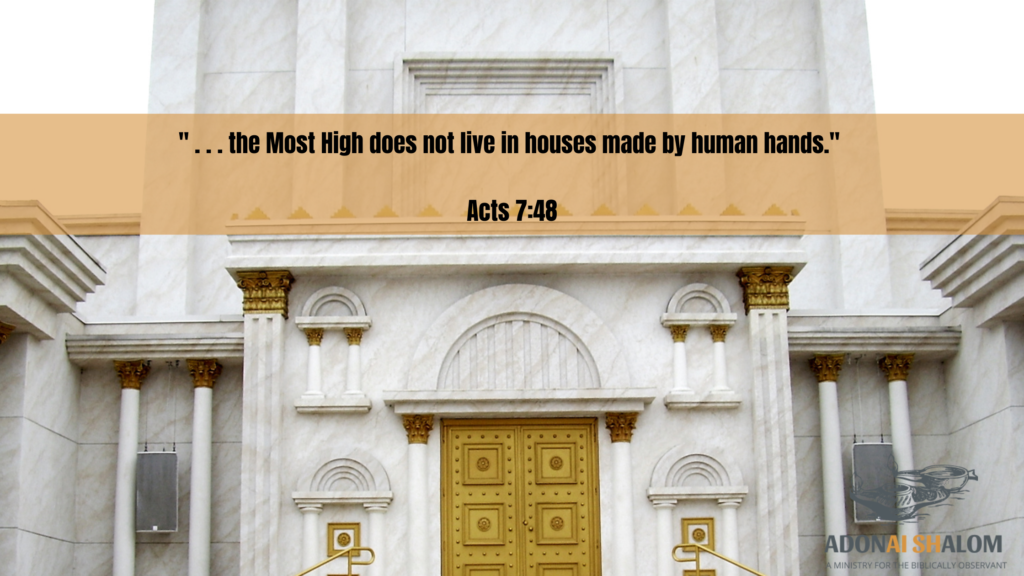
Daniel 1:3-4
“Then the king instructed Ashpenaz, the master of his eunuchs, to bring some of the children of Israel and some of the king’s descendants and some of the nobles, young men in whom there was no blemish, but good-looking, gifted in all wisdom, possessing knowledge and quick to understand, who had ability to serve in the king’s palace, and whom they might teach the language and literature of the Chaldeans.” Daniel 1:3-4
Young, handsome Daniel of Judah with all sorts of good prospects and abilities was suddenly taken away from his home.
I can’t help but think of the Israelis who were taken hostage into Gaza on October 7, 2023.
That type of experience can break a person.
But Daniel‘s gifting and trust in God enabled him to grow from that experience. By seeking God’s wisdom, Daniel was able to allow his experiences to form him into a truly righteous servant of God Most High.
And if you are looking for a word of hope in this troubled time, the spirit of Babylon will not win in the end. While none of us like to hear of more judgment, death, or destruction, we may at least rest knowing that God is handling it:
“As Babylon has caused the slain of Israel to fall,
So at Babylon the slain of all the earth shall fall.” Jeremiah 51:49
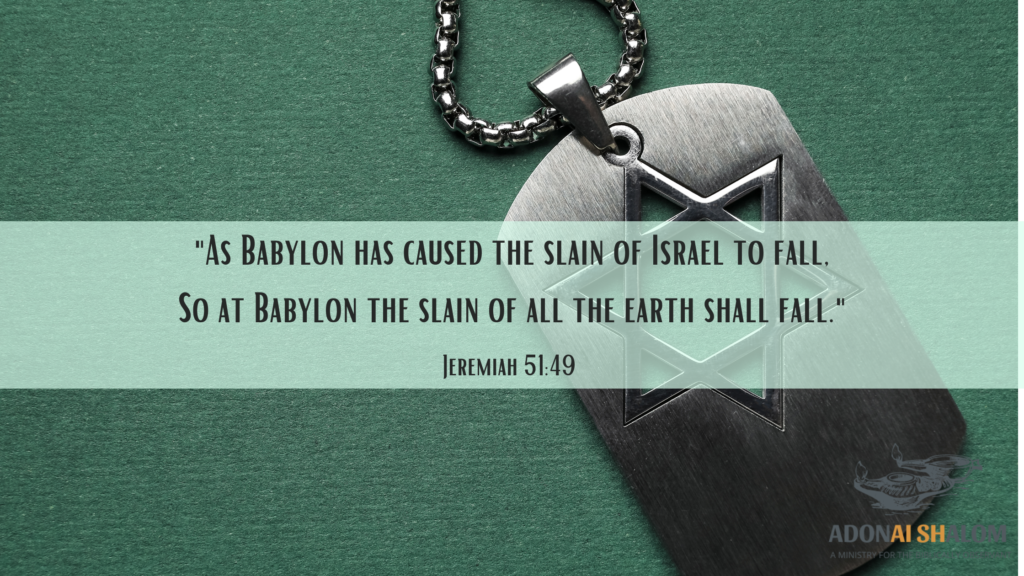
Weaponizing Education
Nebuchadnezzar had a strategy to weaponize education. He re-trained the Judean noble youth in Babylonian customs with the idea that once they grew up, they would be very capable of governing in Babylon.
Sadly, we see similar tactics used today. Hamas and other jihadists enroll children in their terrorist training camps, Russia attacks Ukrainian schools, and our own public school system has been hijacked by secularists. If a conquering nation can control that narrative of the educational system, the weaker nation will cease to exist.
King Nebuchadnezzar thought that by selecting the youth who were fast learners, he would be able to indoctrinate them with Chaldean ideologies.
Truly, King Nebuchadnezzar underestimated just how astute Daniel and his friends really were.
Daniel 1:5-7
Daniel’s name דָּנִיֵּאל
The name דָּנִיֵּאל Daniel is often briskly translated as “God is my Judge.”
And that isn’t incorrect, but there is a nuance that we shouldn’t miss:
The verb from the Hebrew word דן , means “to judge” or additionally, “to govern.”
So Daniel’s very name means “El/Elohim/God is my Governor” or “Governed by God.” “God rules over me.” “God governs.”
Daniel served as governor, but he never forgot that he himself was governed by God.
Names and Identity
Daniel 1:6 records that Daniel’s friends were Hananiah, Mishael, and Azariah.
Hananiah’s name means “God is gracious.”
Mishael means “Who is what God is?”
Azariah means “The Lord has helped me.”
In the Hebrew world, a person’s name was very much associated with their identity. Even today, some of us have names that perhaps we don’t know the clear meaning of, but if someone gives us a degrading nickname or uses our name in an offensive manner, it rightly bothers us.
The ruling regime of the day did everything it could do to strip Daniel and his friends of their Judean world. Nebuchadnezzar hoped these youth would internalize the new names that the Babylonians forced upon them.
The chief eunuch began to call Daniel, Belteshazzar. This name refers to a goddess named Sarpanitu, the wife of the famed Babylonian deity, Marduk. Belteshazzar translates to “Lady Protect the King.” It has been posited that Belteshazzar appears to be a girl’s name. Gender confusion was a thing back then, too. The Babylonians wanted to offend and confuse Daniel so that he would lose his godly values and godly identity.
Hananiah became Shadrach which means “I am fearful of the God.” This is psychological warfare! Babylon wanted fear to be instilled in young Hananiah, to cause him to forget that the One True God is gracious and to cause him anxiety. The spirit of Babylon wants us to lose our faith and trust in God. If we begin to internalize fear, we will not turn to God in prayer as we should. We will either attempt to trust in ourselves or, worse yet, turn to false gods.
Mishael was renamed Meshach, meaning, ” I am of little account.” Again, Babylon sought to diminish the confidence of the Hebrew youth. The world always seeks to make people feel worthless and of no value.
Lastly, Azariah was given the name Abed-Nego meaning, “Servant of (the god) Nebo.” Babylon tried with all its might to convince Azariah that he was no longer servant of the Most High God of Israel. How often the devil tries to convince us that God has abandoned us.
When there is a situation like this, and the world wants to put something on you that isn’t yours to own, you have the power in Christ to reject that. The Babylonians could call Daniel and his friends anything they wanted to, but these faithful servants of the True God did not internalize and accept what the world was imposing upon them.
Three-year training program
Daniel and his friends were forcibly enrolled in a three year Babylonian training program. Daniel 1:5 says the end-goal of this training was that these special youth could serve in the king’s government.
Nebuchadnezzar appointed them to be given the king’s “delicacies” and the royal wine.
But here we arrive at a key memory verse:
Daniel 1:8
Daniel 1:9
Favor in all seasons
“Now God had brought Daniel into the favor and goodwill of the chief of the eunuchs.” Daniel 1:9
Always seek the favor of God. Just as we are to be ready to preach in season and out of season (2 Timothy 4:2), we must be ready at any time to serve God in any situation. When we have diligently prayed and fasted, He gives us the favor we need:
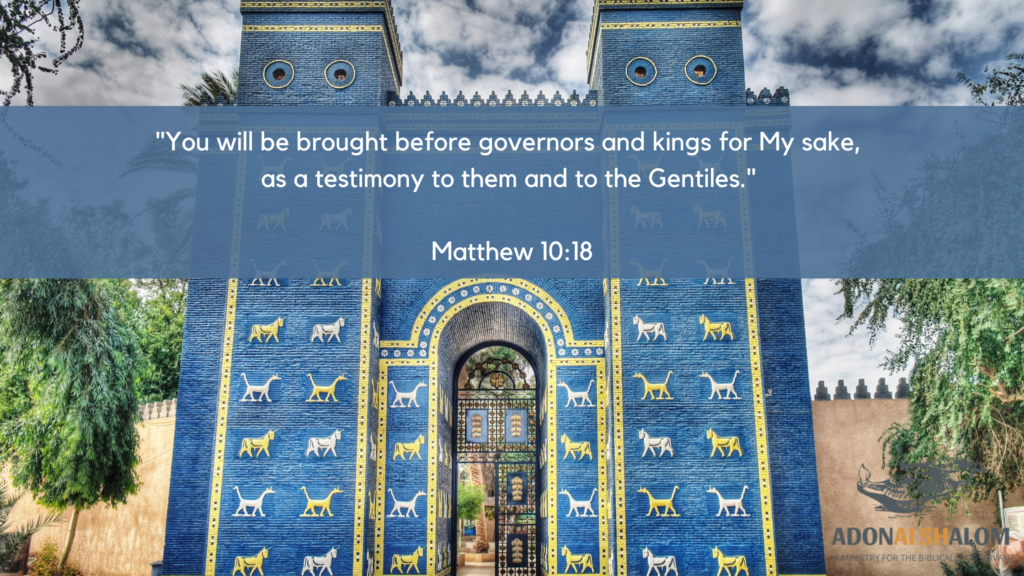
Daniel 1:10
Daniel was not alone in requesting to abstain from the king’s food and drink. “Your food” is plural in Hebrew. Daniel’s friends agreed with him in refusing to eat the prescribed meals.
What was the issue with the food?
The Scriptures do not tell us exactly what was on King Nebuchadnezzar’s standard menu, but we do know that Daniel, Hananiah, Mishael, and Azariah were observant Jews.
Babylon’s food would have included
- nonKosher/unclean/forbidden food – food not prepared according to the Torah’s regulations
- meat dedicated to Babylonian idols
It would have been a violation of conscience for these Hebrew youth to eat nonKosher meals.
The chief of eunuchs, while kind to Daniel, expressed concerned that he would get beheaded over this!
So Daniel turns to a steward, rather than the chief. Did you ever notice that before?
Daniel 1:11-15
God is the strength of my heart and my portion forever
Daniel trusted in God. He had the confidence that despite not eating any meat of any kind, he and his friends would be able to maintain their health and strength because God would be their portion.
Psalm 73:26 “My flesh and my heart may fail, but God is the strength of my heart and my portion forever.”

Daniel 1:16-17
The “wisdom” of Babylon
Like Moses before them, Daniel, Hananiah, Mishael, and Azariah were educated in the literature of the culture they found themselves in: “And Moses was learned in all the wisdom of the Egyptians, and was mighty in words and deeds.” Acts 7:22. With God’s help, the four captive Judeans learned the Chaldean language and were educated in literature, science, and astrology: the “wisdom” of Babylon.
Daniel stood out – he could understand visions and dreams.
Being knowledgeable has its place. How valuable it is when a God-fearing, God-loving person uses their God-given gifts to acquire knowledge and to serve, even in secular roles. But even more valuable than that is a pure and contrite spirit, a Spirit-filled person who God entrusts with revelation through visions, dreams, and interpretations thereof. Daniel had this anointed combination and it granted him great favor.
Daniel 1:18-21
Results of the Interview
The Bible says that King Nebuchadnezzar interviewed the young men. They had to prove themselves prepared to serve him, and he surely was curious to know how they were faring on their vegetarian diet.
Daniel, Hananiah, Mishael, and Azariah proved themselves worthy of the tasks ahead, for “none was found like [them].” They served before King Nebuchadnezzar and the Hebrew youths were 10 times more accurate in their wisdom and understanding than Babylon’s own magicians and astrologers.
God is our Governor!
As Daniel’s name declares, God is our Governor. He rules over all of us in fairness, righteousness, and love.
We do not have to “prove” ourselves worthy. In fact, that would never be possible.
We are formidably unworthy of all that God has done for us. He has spoken throughout history and used faithful servants like Daniel, Hananiah, Mishael, and Azariah. He has made a way for our salvation from sin and death by sending His Son, Jesus, (Yeshua) to save us.
Allow the LORD Most High to rule and reign over your life today! Be inspired by Daniel’s great favor and seek the LORD with all your heart! Have confidence and faith, that no matter where life takes you or what is set before you, God will provide, intervene, bless, and help you if you will trust in Him today.
